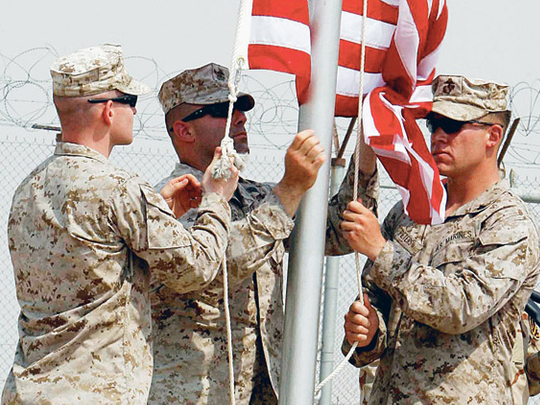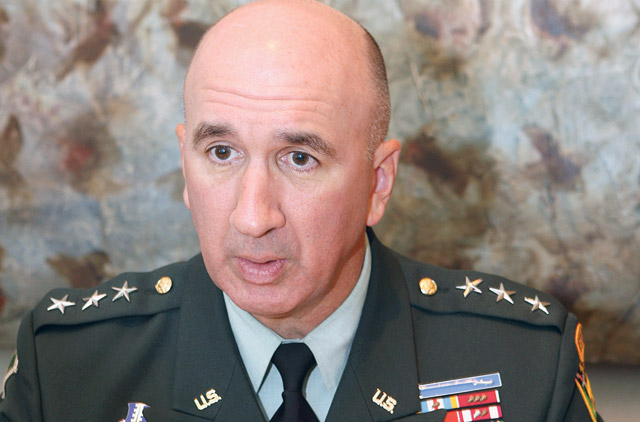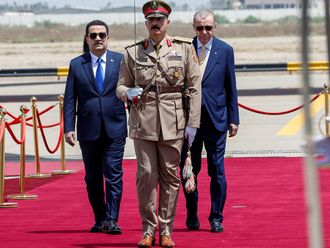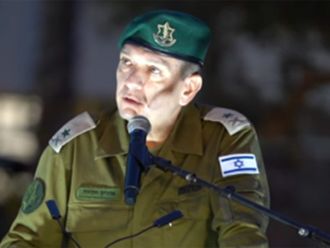
Dubai: Iraqi forces will not have everything they need to defend their country against external threats by December 2011 when a complete US withdrawal takes place, a top US officer said.
In an exclusive interview with Gulf News, Lieutenant General Michael Barbero, Deputy Commanding General of US forces in Iraq, said the withdrawal of US troops stationed in Iraq was not linked to the formation of the country's government
General Barbero said that a small contingency will remain in Iraq and will work in the embassy under the control of the ambassador.
He also said that there is a resistance and resentment starting at the Iraqi level, against Iranian influence and pressure in Iraq.
"I see this in my discussions with Iraqi security leaders," he added.
General Barbero also said: "My estimate is that Al Qaida in Iraq is not capable of threatening the Iraqi government".
"However, they are capable of sporadic violent attacks against innocent Iraqis, but those are becoming further spaced apart and less effective."
The following are excerpts of the interview held on Sunday:
Gulf News: How do you evaluate and regard the success and failure of the new US army policies in Iraq ahead of its military withdrawal by the end of 2011?
Lieutenant General Michael Barbero: Our measures are success in terms of the capabilities of the Iraqi security forces. My job is to advise and equip the security forces. And as I see it, Iraqi security forces are in the lead in providing security in Iraq.
They are prepared to take over internal security in Iraq through the ministry of interior and the police forces, and we will continue to have some work to be done to build up their capabilities to defend the sovereignty of Iraq against external threats. So as I look at Iraqi security forces I'll say there is progress every day, but there is still work to be done before the end of our mission in December 2011.
Does the US intend to withdraw all its military troops from Iraq at that time?
Right now we are working towards September 1 where we will be down to 50,000 troops. Currently there are 74,000 troops, and since the height of the surge, it has been a continued drawdown. We will continue to transfer military bases to the government of Iraq in a very orderly process, working hand in hand with our Iraqi partners. We continue to look towards December 2011 where we will drawdown to no troops except for a small element in the embassy like in other countries in the region where we have normal relations. This contingency will work in the embassy under the control of the ambassador. An office of security cooperation will be in place like in Egypt and other countries in the region, as we achieve normal relations with Iraq.
When US Vice-President Joseph Biden visited Iraq before the March 7 parliamentary elections, Iraqis were hoping the new government would lead to stability and economic recovery. Now, all US efforts and Iraqis' hopes for a democratic and free Iraq seem shaky. My question is, will the failure to form a new government four months after the vote, continuing attacks and suicide bombings by insurgents, continuing tensions between the KRG and the central government over Article 140, other potentially dangerous remaining issues, and finally, the meddling of regional powers in the political process of Iraq, be enough to paralyse the entire exit strategy of the US from Iraq?
No, our drawdown strategy is not linked to the formation of the government. Our drawdown strategy is linked to an agreement with the government of Iraq and that is the plan we are executing.
I agree with you, it has taken too long for the government to form. On March 7, Iraqi security forces set the conditions, planned and executed a free and fair election. Iraqis went out and voted. It is time for Iraqi leaders to respect that vote and form a government that represents all parts of Iraq. That is what Iraqis want. It is time for Iraqi politicians to place the interest of Iraqis above any other personal interest.
I would also say that since the elections and until the present time, Iraqi security forces have performed their duties. They are professional; they have remained neutral and not involved in political discussions. They have executed their duties to a high standard. That demonstrates the level of security of these Iraqi forces and institutions.
Regarding the attacks, since the height of the surge, the number of attacks and levels of violence has dropped by 90 per cent. We turned security in cities to the Iraqi security forces a year ago.
Since that time, attacks have dropped by 50 per cent. The Iraqi forces are improving their capabilities, and they are capable of protecting the population.
Am I concerned that there are acts of violence? Absolutely. If you ask me if the level of attacks will increase then I will say that I do not see that.
The trend is going in the other direction.
What also needs to be discussed is that the disputes in Iraq today are political and not security related, and these issues are being resolved by Iraqis by discussions and not violence. Shouting and not shooting.
About the Kurdish Regional Government: General Ray Odierno the US Commander in Iraq describes things he calls: "Drivers of Instability". The tensions between Iraqi Arabs and Kurds are among the drivers of instability we must reduce. In the last seven months more progress has taken place in reducing these tensions, that I have seen in seven years.
On the ground today we have 20 checkpoints manned with KRG, Iraqi army and US forces providing security in the formerly disputed areas.
Recently there have also been agreements signed between the Kurdish Peshmerga and the Ministry of Defence and between the Federal Ministry of Interior and the Zarbanis — Kurdish security forces. Both are also training in Government training centres.
Regional meddling is a problem, to be honest; Iran is trying to extend its influence in Iraq through funding and arming some of the extremist groups such as Kata'ib Hezbollah and Asaeb Al Haq.
These not only attack US forces, but Iraqi forces as well.
Iran is trying politically to force a government and insecurity by supporting these extremists. However, I think there is a resistance and resentment starting at the Iraqi level, against this influence and pressure from Iran. I see this in my discussions with Iraqi security leaders.
Is the complexity of the new scene in Iraq following the March 7 parliamentary election that made no immediate winner seen as strong evidence for the possibility of returning to a new round of violence, the same as the sectarian carnage in 2006-07?
I do not see indicators to that. Iraq has moved beyond that. Al Qaida in Iraq is still trying to execute its failed strategy of setting up Shiite against Sunnis. However, Iraqis have rejected that tremendously and Al Qaida in Iraq has been reduced.
Iraqis are frustrated, they have voted and they want a new government which focuses on services.
Many political analysts are talking about the "Biden Plan," sometimes referred to as "soft-partition," which restricts Baghdad's function to a federal zone (a Bosnia-type solution) that mainly deals with three issues: national defence, foreign relations, and the distribution of oil money. Do you think the plan is on the table today?
I have spent 40 months in Iraq and even in the dark and tough days, I have always felt that the forces holding the country together are stronger than the forces trying to pull it apart.
I do not see Iraq heading towards this partition. What I see is what the elections showed us: Iraqis want an Iraq which represents all its components.
How well are Iraqi security forces trained to take over all responsibilities once the complete withdrawal takes place in 2011? Is there a margin of concern that Iran will step in the vacuum that will be left behind by the US troops?
First of all, I do not see a vacuum taking place. There has been an orderly transition of responsibilities to reach December 2011. I see a continued development of Iraqi security forces capabilities. Our drawdown to 50,000 troops has been made possible because of the developed security forces and the drop in violence.
How well are Iraqi armed forces equipped to defend Iraq in case of any aggression and to sustain sovereignty?
We have trained the Iraqi army to be the most capable army in the region with a lot of experience, tremendous leaders and the forces are well equipped. The Iraqi navy is responsible today for the security of one of the two oil platforms of Iraq's oil flows near Basra.
No doubt they will be in charge of the two oil platforms, territory waters and security infrastructures well before December 2011. The Iraqi air force has 100 aircraft, 57 trained pilots with helicopters and fixed wings, in addition to several C30s. They continue to grow every day as their size doubled from 2,700 to 5,400 personnel during last year.
So they will have most things in place. They will have a good foundation across all the services.
There are still some areas that need to be developed to be fully functional for Iraq to defend its sovereignty against external threat by December 2011, but we are working on them.
They will have most things in place, they will have a good foundation across all the services, but they will not have everything they need to provide for the full defence of Iraq against external threat.
For example, air sovereignty is in three parts: first it is to see through radars any threats or aircraft coming, they have long- range radars and they will be able to do that with trained operators.
The second part is the ability to warn the command and control network. The third part is the ability to respond with fighters. Iraq will not have fighters by December 2011 because it takes a long time to train fighter pilots. So these areas are under development.
The army will be able to defend the country against threats. The first of the 140 M1 tanks arrive next month. Iraqi security forces have been the fastest growing security forces in the world and they will continue to grow rapidly as we approach December 2011.
What is the significance of nominating General James Mattis to supervise the military operations in Iraq and Afghanistan? If the Congress approves the nomination, will the appointment help in strengthening Iraq's armed forces?
If the nomination is approved, he will bring in a great amount of experience to Iraq significantly. I do not think he will have any impact on changing our strategies in Iraq, other than that he will continue to support General Odierno and our mission and transition of responsibilities.
How strong or weak is Al Qaida in Iraq today?
Al Qaida in Iraq has been significantly weakened. Over the previous weeks we have either killed or captured 46 of its top leaders including the top two. Their financial network operations have been significantly degraded.
Their media operations where they publicise and recruit has been degraded. My estimate is that Al Qaida is not capable of threatening the Iraqi government. However, they are capable of sporadic violent attacks against innocent Iraqis, but those are becoming further spaced apart and less effective.
Will Iraqi security forces be able to handle security once all US troops have been withdrawn? Do you think violence will increase as the troops are sent home? Tell us what you think.












